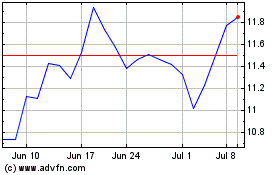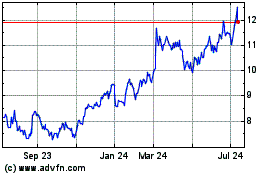A state-controlled Chinese company's plan to invest about $2
billion in the Taiwanese semiconductor industry has intensified
election-year concerns in Taiwan that could set back China's
ambitions to develop a leading-edge microchip industry.
The dispute revolves around recent Chinese inroads into Taiwan's
chip sector, a major source of Taiwanese economic growth, pride and
an important supplier of components for the world's gadgets. It is
part of a broader debate in Taiwan—an island that Beijing's
political leaders consider a renegade province—about growing
economic ties with the mainland.
On Thursday, Xu Jinghong, chairman of state-controlled
conglomerate Tsinghua Holdings Ltd., addressed Taiwanese worries
about Chinese investment in its chip industry. Tsinghua Holdings'
chip arm, Tsinghua Unigroup Ltd., has in recent days unveiled plans
to invest to Taiwanese companies.
"What's so bad about cooperation between the mainland and
Taiwan?" he said. "If Taiwan can continue to close itself, it will
lose opportunities for future development."
Mr. Xu was responding to questions about Tuesday comments from
Tsai Ing-wen, the Taiwanese opposition leader who is the favorite
to become Taiwan's next president in elections next month. Citing
Tsinghua Unigroup's ties to Beijing, she said she believed the
deals were part of broader efforts to control Taiwan's
semiconductor sector.
"This is a very, very large threat to Taiwan's industry," she
said in Taiwan. "If these issues are not clarified, I don't think
there is any room for opening up."
Ms. Tsai's wariness reflects broader sentiment in Taiwan. Her
main rival Eric Chu is from the ruling party, the Kuomintang, which
traditionally supports more cross-strait investment. But Mr. Chu
has taken an even stronger stance than Ms. Tsai against China chip
investment ahead of the election, which analysts say is a play to
win voters.
"Tsinghua Unigroup has announced so many rapid-fire investments,
it scares the people," said Mark Li, a Bernstein Research
technology analyst. "It's too fast, too much."
Speaking on the sidelines of China's Wuzhen Internet Conference,
Tsinghua Holdings's Mr. Xu said his company is seeking "a win-win
situation." "It is not, as some narrow-minded people in Taiwan
would say, that the mainland is trying to occupy or invade
Taiwan."
The back-and-forth illustrates the increasingly complex
relationship between China and Taiwan. Chinese President Xi Jinping
and Taiwanese President Ma Ying-jeou met in November, the first
meeting between the leaders of the two governments since the island
and the mainland split in 1949. Trade has also grown. At the same
time, China's Foreign Ministry on Thursday criticized U.S. approval
of its first major sale of weapons to Taiwan in four years.
Both the Chinese and Taiwanese chip industries see benefits in
cooperation. China needs Taiwan's technology to build advanced
chips. Taiwanese companies need Chinese capital and could benefit
from lower-cost labor if it made more chips on the mainland.
Tsinghua Unigroup has become China's semiconductor champion. It
has announced investments totaling more than $20 billion so far
this year, making it one of the chip sector's most acquisitive
companies. It is part of China's efforts to nurture a chip industry
so that it no longer relies on foreign suppliers.
Tsinghua Unigroup recently announced plans to become the largest
shareholder in three Taiwan chip packaging companies: Siliconware
Precision Industries Co., ChipMOS Technologies Inc. and Powertech
Technology Inc. The proposed deal with Siliconware—known as
SPIL—was controversial due to SPIL's status in Taiwan's tech
industry and importance as an Apple Inc. supplier. SPIL's largest
shareholder, the Taiwanese firm Advanced Semiconductor Engineering
Inc., offered to buy out the rest of SPIL at Tsinghua Unigroup's
bid price.
While Chinese investment is allowed in Taiwan's chip packaging
sector, chip design companies are still off limits. Analysts say a
swing factor is whether Mr. Ma, the Taiwanese president, will try
to open up chip design investment before his term ends in May, as
some Taiwanese chip design firms have requested, although the tight
timeline would make it difficult.
T.C. Tu, general director of the competitiveness center for
Taiwan's state-funded Industrial Technology Research Institute,
said China will become a major competitor to Taiwan in microchips
within a decade and said Taipei should carefully consider growing
industry ties.
"Taiwan should cooperate with China in chips in areas where
China dominates the market, but maybe should refrain in areas where
Taiwan sells mostly to Europe or the U.S.," he said.
Sun Lih-chyun, a spokesman for the executive branch of Taiwan's
government, said Thursday that Tsinghua Unigroup has yet to
officially submit its investment plans for government review. When
it does, Taiwanese regulators will consider whether it poses a risk
to Taiwan's chip sector, he said.
Tsinghua Unigroup Chairman Zhao Weiguo said in a statement
Thursday that his company hasn't been in contact with Ms. Tsai's
party. He said Tsinghua Unigroup isn't a government department and
he hopes the company will be treated the same in Taiwan as
companies from other countries are.
"After all, we and Taiwanese people are all Chinese, we have the
same roots and ethnicity," he said.
Write to Gillian Wong at gillian.wong@wsj.com and Eva Dou at
eva.dou@wsj.com
(END) Dow Jones Newswires
December 17, 2015 08:05 ET (13:05 GMT)
Copyright (c) 2015 Dow Jones & Company, Inc.
ASE Technology (NYSE:ASX)
Historical Stock Chart
From Mar 2024 to Apr 2024

ASE Technology (NYSE:ASX)
Historical Stock Chart
From Apr 2023 to Apr 2024
